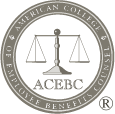Thomas P. Deering
Thomas P. Deering, who passed away in 2005 at age 76, was a nationally recognized authority in the area of employee benefits law before and under the Employee Retirement Income Security Act of 1974 (“ERISA”). He was inducted into the American College of Employee Benefits Counsel (the “College”) in 2000 as an Emeritus Fellow.
Tom graduated from the New Mexico Military Institute in Roswell, NM in 1949. He received a B.S. in Chemical Engineering in 1951 and earned his LL.B., Order of the Coif, in 1956 from the University of Colorado in Boulder. He was editor-in-chief of the University of Colorado Law Review from 1955 to 1956.
During the Korean Conflict, Tom served in the U.S. Army at Fort McClelland in Anniston, AL, where he taught chemical engineering and its application to military science and strategy.
Tom practiced law in Portland, OR from 1956 until his retirement in 1999 at the law firm of Stoel Rives LLP, where he rose to senior partner. He specialized in employee benefits and pensions. In addition to his client work, he used his expertise to help the Internal Revenue Service (“IRS”) identify practical solutions for the evolving regulations under ERISA. In 1992, he provided comments advocating that good faith errors should result in Internal Revenue Code section 415 limits on annual additions and benefit accrual violations, rather than plan disqualification.
Tom recognized the importance of building security for employees for their retirement years and worked with employer and employee groups to do so. Committed to the development of employee benefits as its own legal discipline separate from the fields of tax and labor, he authored many benefits-related publications and commentaries and lectured extensively for the American Law Institute-American Bar Association (“ALI-ABA”), the Association of Private Pension and Welfare Plans (later, the American Benefits Council), the Western Pension and Benefits Conference, and other organizations.
College Fellow Greg Macpherson observed that Tom had a passion for the craft of fine lawyering and took a particular interest in the careful drafting of documents. Tom opposed usages that he regarded as archaic and not helpful. He favored lean text without repeating the same idea in multiple words. For many lawyers faced with drafting lengthy plan documents filled with compliance requirements of ERISA and its amendments, Tom’s drafting lessons were key.
College Fellow Vince Cacciottoli, who attended many of Tom’s seminars, echoed Greg’s comment, noting that, to appreciate one of Tom’s great and even revolutionary contributions to employee benefits practitioners, one needed to recall a time when plan documents were notorious for their Ciceronian-length sentences replete with “hereinaboves” and “hereinafters” and the dreaded “notwithstanding the above” with paragraphs that ran on for a page or more. Tom introduced large numbers of attorneys from all over the country to his modern, clean, and concise style of drafting. He distilled ERISA jargon down to plain English and placed every separate point, as appropriate, in its own subsection, paragraph, subparagraph, clause, or subclause. Lawyers and clients alike could easily work through the resulting clear and precise plan document.
Greg Macpherson recalled that the energy Tom brought to writing and speaking was remarkable and continued to the end of his career. At the same time, Tom nurtured the skills of junior lawyers, creating opportunities for them to become more visible. He readily handed off the lead role with significant clients when doing so delivered the best service.
Tom loved the outdoors, particularly the old growth forests of the Cascades. His civic and charitable activities were many, for he believed public service to be a vital part of his life. His civic contributions included serving as a board member and vice president of the American Civil Liberties Union. In his professional and personal contributions, Tom lived the maxim that “the more you have, the more you have to give.”
Photo Source: The Decade Book, American College of Employee Benefits Counsel 2000-2010


